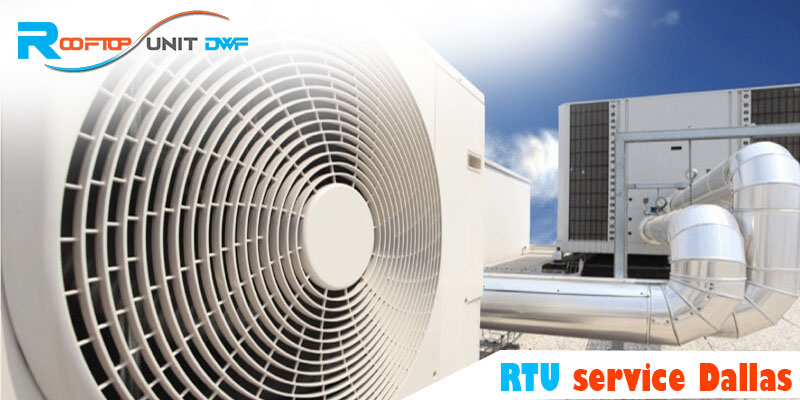Present-day rooftop HVAC systems provide better efficiency, improved building ventilation facilities, & advanced control facilities. Rooftop units are being used for an increasingly broad array of building applications. They fit well with many present-day building designs for production, warehouses, & offices. Unlike a lot of applied systems, rooftop unit service, Dallas, is preassembled for speedy installation & start-up, meeting the requirements of many owners for fast building access.
Range of Styles & Sizes
Most rooftop units are graded in tons of air-conditioning capacity (one ton equals nearly 3.5 kW) & range in size from 6-150 tons, & indeed can be installed in multiples. A great advantage of the rooftop approach with rooftop unit service, Dallas, is that it rules out the requirement in the building interior for almost all mechanical plant gears—air handlers, chillers, heating units & associated equipment.
The present-day new manufacturing facility is often a single-story structure. However, this is done to promote conveyor movement of stuff & to simplify future facility expansion or process realignment. Horizontal design makes a broad expanse of rooftop accessible. Larger buildings usually use multiple rooftop systems to reduce interior ducting, permit effective urban planning, & divide the physical load.
Units Combine Various Functions
Common elements of today’s packaged rooftop systems at RTU service, Dallas, are air handling, electric compression cooling, & solid-state controls. In all but the hotter climates units, also include heating components, which might either be resistance electric, natural gas-fired, or heat pump. Where a load of heat is significant, gas is often preferred due to the lower energy cost.
However, additional collective features involve dehumidification/humidification, building ventilation management, & recovery of air energy in the exhaust. Unit types vary from cataloged units with standard optional elements to customized designs with particular features developed for specific applications.
Economizers Minimize Operating Costs
A useful function in the HAVAC system’s rooftop units is the so-called economizer function. Well, this is the capability of utilizing filtered outdoor air for cooling instead of running the compressor, thereby saving significant power.
Economizer systems test both the humidity & temperature of the outdoor air to make sure it is cool enough & dry enough to meet the comfort standards of the building. The economizer function is used in a lot of areas during the shoulder months when humidity & temperature levels are both moderate. The use of economizer cooling provided by rooftop unit service, Dallas, is a priority in the efficiency standards of many new buildings.
Significant Gas Heat Withholding Ratios
On the gas heating side, RTU service, Dallas points out that present-day models feature significant turndowns to 5% to 10% of total capacity & modular gas furnaces, which are provided on about ten percent of today’s units. Another power-saving feature for both electricity & gas is 2-inch foam panels with R-13 insulation to minimize thermal losses thru the casing.
Advanced Remote-Control Powers
Rooftop unit control technology has also transformed significantly in the past few decades. Advanced control units allow operators to know what is happening with their RTU units without going to the roof. However, alarms can be sent by email or text to facility management staff when problems take place.
Today’s advanced control systems can be accessed by tablets or smartphones as well. Well, with rooftop unit service, Dallas, you’ll get a 24/7 monitoring service deal if you want to outsource some of the maintenance. Especially the wireless control systems are very much helpful in factory operations where internal activities are frequently changed & ventilation or comfort requirements change consequently.
Dehumidification Approaches
Various solutions are used for handling moist outside ventilation air. One is the cooling system’s upgraded capabilities for part-load cooling with mutable speed compressors & fans. With these, the usual dehumidification function reaches out over longer cycles. Many rooftop units like RTU service, Dallas, also provide hot gas reheating dehumidification functions for venting air.
Energy wheels in most current units make an additional contribution to dehumidification when cooling loads are moderate & dew points are high. Lastly, dedicated gas-fired drying dehumidification systems might do an excellent job of pre-treating ventilation air for supply to the RTU units. Especially, this solution is valuable in industries like snack foods, pharmaceuticals, or printing, where needed humidity levels are lesser than can be obtained by air cooling only.
Maintenance
Rooftop HVAC systems might have a long operating life of 15-20 years or more is not exceptional. However, there is no alternative for a strong protective maintenance program. Also, this can help prevent emergency replacement conditions.
Even if your RTUs are well-maintained & still operating, it can be useful to have a power analysis performed by a certified contractor. Then a pro-active decision might be made whether to switch the unit based on power savings or to wait till a major part fails. Fixing on malfunction often restricts the potential savings of a substitute unit since the provision of a new unit tends to guide the decision process.
Conclusion:
Rooftop units that are being installed nowadays have clear advantages: powerful ventilation capacities, greater operating efficiency, better controls, & higher turndown ratios. Whether owners are considering replacing older systems or are involved in the construction of a new plant, the recommendation is to provide the new HVAC rooftop units significant consideration.
Call to Action:
Do you want to install a new HVAC system? Go to Rooftop Unit DWF to get the best rooftop unit service, including installation, repair, & maintenance service. For more information, call this number (214) 550-3458.



Comments are closed